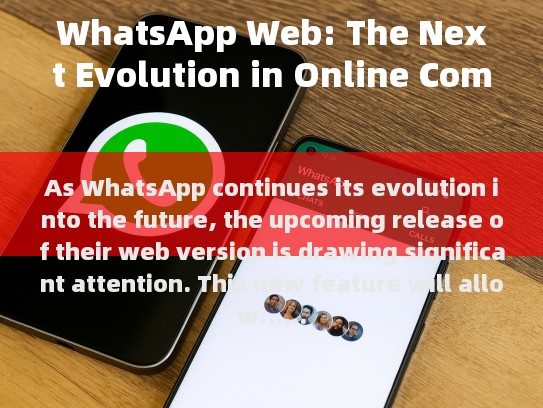WhatsApp Web is the latest evolution of the popular messaging app WhatsApp. Unlike its desktop and mobile counterparts, it allows users to communicate with each other via web browsers on computers or tablets without needing an internet connection. This feature provides convenience for people who frequently use their devices but do not always have access to a stable Wi-Fi network. With WhatsApp Web, users can enjoy the same seamless experience as on their smartphones while still being able to interact offline. This innovation opens up new possibilities for remote work, collaboration, and personal communication. Additionally, WhatsApp's commitment to user privacy and security remains intact, ensuring that messages are encrypted and only accessible to the intended recipients. Overall, WhatsApp Web enhances the overall user experience by providing flexibility and accessibility across various devices and networks.
As WhatsApp continues its journey into the future, the imminent release of their web version is generating considerable interest. This new feature promises to revolutionize the way users interact, seamlessly integrating into their daily lives via any device connected to the internet.
This integration is set to deliver multiple benefits, including improved accessibility, enhanced security features, and broader functionality across various platforms. For developers keen on contributing to this project, a dedicated GitHub repository exists where they can engage with the community and share their insights. Furthermore, WhatsApp plans to invest heavily in enhancing privacy and data protection measures, aiming to restore user trust and confidence.
In summary, the launch of the WhatsApp web version marks a crucial milestone in the company's digital transformation strategy, offering a more flexible and accessible platform for global communication.

In Today’s Digital Landscape
Communication has never been more accessible or varied, making it easier than ever to connect with friends, family, and colleagues worldwide.
However, Technology Evolves At An Unprecedented Pace
One notable development in the near future involves the possibility of a mobile app running entirely in the browser. This article explores what a "web version" of WhatsApp might mean for users, developers, and the overall messaging ecosystem.
Why a Web Version?
The primary motivation behind creating a web-based WhatsApp is to enhance convenience and accessibility. Unlike native apps that require separate downloads and installations, a browser-based solution allows users to access WhatsApp effortlessly from any device equipped with a modern web browser—whether smartphones, tablets, or desktop computers. This approach offers a consistent interface across all devices, eliminating the need for additional software updates or maintenance efforts.
Furthermore, a web version of WhatsApp presents new opportunities for businesses and organizations. By leveraging existing web technologies, companies can develop robust and scalable messaging solutions without the overhead of app development and maintenance.
Technical Considerations
Developing a fully functional web version of WhatsApp faces significant technical challenges. It requires maintaining the core functionalities of the original app while ensuring compatibility with various browsers and devices. Cross-platform support necessitates careful consideration of HTML5, CSS, JavaScript, and other web technologies. Security concerns must also be addressed to ensure user data safety, especially given the sensitivity of message content and contact details. Advanced encryption methods and regular security audits are vital components of protecting user data.
Regular updates and user feedback are crucial to keep abreast of emerging threats and continuously improve the security posture.
User Experience
To maximize user engagement, the web version of WhatsApp should prioritize a clean, intuitive interface that closely resembles the mobile app. Key features like group chats, video calls, and file sharing should remain intact, ensuring uninterrupted interaction. Integrating with social media platforms, calendar services, and other third-party tools can further streamline communications.
Developer Opportunities
For developers interested in contributing to the project, there are numerous opportunities. Using frameworks like React or Angular, they can create highly interactive and responsive interfaces. Leveraging API resources provided by Facebook (now Meta), teams can swiftly adopt best practices and standards. Continuous collaboration with the WhatsApp team and participation in related projects can foster innovative ideas and cutting-edge solutions.
Conclusion
As WhatsApp prepares for its web version, the industry stands at a pivotal moment where traditional boundaries are being redefined. Traditional limitations are being transcended to redefine the realm of messaging experiences. Whether it becomes a reality within the next few years remains uncertain, but one thing is clear: the world of messaging is evolving rapidly, and those who embrace these changes will benefit greatly in terms of accessibility, cost-efficiency, and user satisfaction.
Stay updated on the progress of the WhatsApp web version and explore strategies to position yourself strategically in this transformative era of technological innovation.
By understanding these advancements, you can prepare for the future of online communication and stay ahead in today's dynamic landscape.
